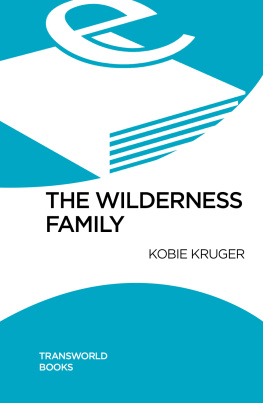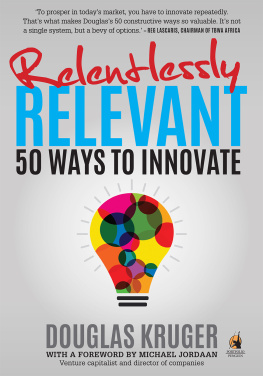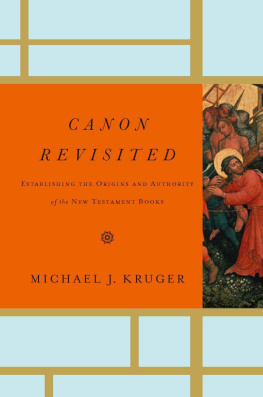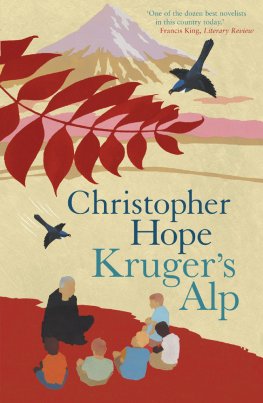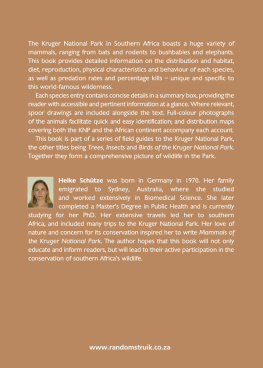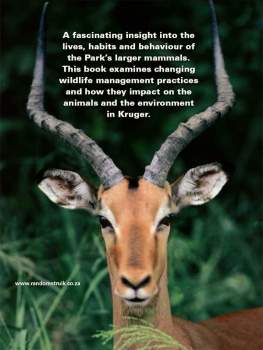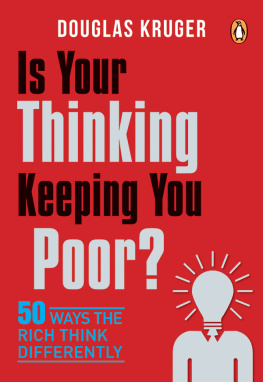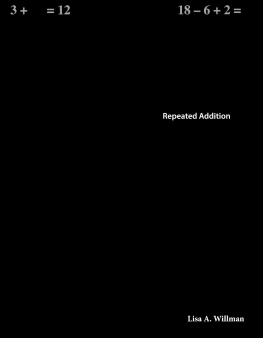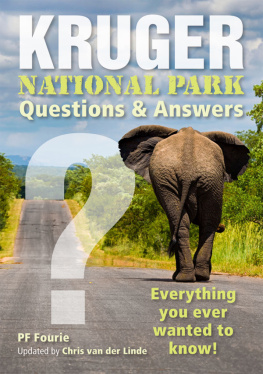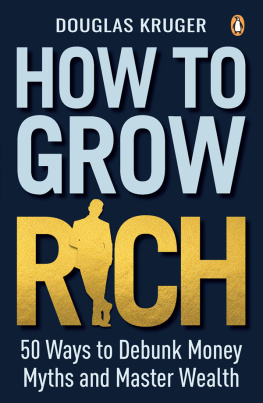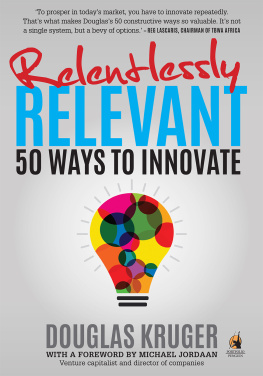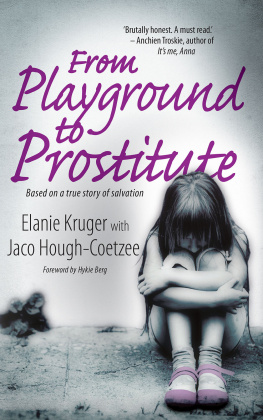Krüger - The Wilderness Family
Here you can read online Krüger - The Wilderness Family full text of the book (entire story) in english for free. Download pdf and epub, get meaning, cover and reviews about this ebook. City: London, year: 2012, publisher: Bantam;Transworld Digital, genre: Detective and thriller. Description of the work, (preface) as well as reviews are available. Best literature library LitArk.com created for fans of good reading and offers a wide selection of genres:
Romance novel
Science fiction
Adventure
Detective
Science
History
Home and family
Prose
Art
Politics
Computer
Non-fiction
Religion
Business
Children
Humor
Choose a favorite category and find really read worthwhile books. Enjoy immersion in the world of imagination, feel the emotions of the characters or learn something new for yourself, make an fascinating discovery.
- Book:The Wilderness Family
- Author:
- Publisher:Bantam;Transworld Digital
- Genre:
- Year:2012
- City:London
- Rating:4 / 5
- Favourites:Add to favourites
- Your mark:
- 80
- 1
- 2
- 3
- 4
- 5
The Wilderness Family: summary, description and annotation
We offer to read an annotation, description, summary or preface (depends on what the author of the book "The Wilderness Family" wrote himself). If you haven't found the necessary information about the book — write in the comments, we will try to find it.
Krüger: author's other books
Who wrote The Wilderness Family? Find out the surname, the name of the author of the book and a list of all author's works by series.
The Wilderness Family — read online for free the complete book (whole text) full work
Below is the text of the book, divided by pages. System saving the place of the last page read, allows you to conveniently read the book "The Wilderness Family" online for free, without having to search again every time where you left off. Put a bookmark, and you can go to the page where you finished reading at any time.
Font size:
Interval:
Bookmark:
When Kobie Krger, her game-ranger husband and their three young daughters moved to one of the most isolated corners of the world a remote ranger station in South Africas vast Kruger National Park she might have worried that she would become engulfed with loneliness and boredom. Yet the seventeen years spent in this spectacularly beautiful park proved to be the most magical of their lives.
Kobie recounts their adventures in this vast reserve a place where hippos basked in the waters of the Letaba River, storks and herons perched along the shoreline, and fruit bats hung in the sausage trees. But not all was peace and harmony. The Krgers soon became accustomed to the sneaky hyenas who stole blankets and cooking pots, the pythons that slithered into the house, and the usually placid elephants who grew foul-tempered in the violent heat of the summer. And one terrible day, a lion attacked Kobus in the bush and nearly killed him.
Yet nothing prepared the Krgers for their greatest adventure of all, the raising of a lion cub who, when they found him, was on the verge of death. It is the rearing of this orphaned prince, and their moving endeavours to teach him to become a real lion who could survive with his own kind in the wild, that lie at the heart of The Wilderness Family. It is a memoir of an enchanting place and time that can never be recaptured.
FAMILY
At Home with Africas Wildlife
Kobie Krger
Line drawings by Karin Krger
For Kobus and our daughters, with love
KRUGER NATIONAL PARK


MAHLANGENI
IN A FARAWAY corner of the north-west region of Kruger National Park, there is a heart-shaped basin of sand and forest where two rivers meet. The Little Letaba enters the basin from the north, the Greater Letaba from the west. They come together in a swirl of froth and gurgling whirlpools, then settle down to continue sedately onwards as one waterway, the Letaba River. Its gently moving waters are full of hippo and crocodile, its sandy shores patterned with game tracks. On all sides of the river basin, mopani woodlands roll away into a vast landscape of wilderness and solitude.
The area is called Mahlangeni, which is the Tsonga word for meeting place.
One of the most isolated ranger sections in the park, Mahlangeni was home to my game-ranger husband, our three daughters and me for eleven years.
Our house on the north bank of the Letaba overlooked the merging rivers and the forested basin. Squirrels and mongooses played in our garden. Bushbuck and monkeys were daily visitors. A lone leopard patrolled the neighbourhood at night. Other neighbours included baboons, hippos, elephants and lions. Throughout the years various strays and orphans from the animal kingdom were temporary members of our family.
Our days were filled with magical moments and unforgettable adventures.
KOBUS WAS BORN and raised on a bushveld farm in the Northern Province of South Africa. Since his early childhood he has loved the African bush and its creatures and wanted to protect them from destruction.
Although I was also born on a farm in the Northern Province, not far from where Kobus was born, we didnt meet until almost twenty years later when we were both studying at the University of Pretoria.
After discovering that we shared not just a first name (mine being the feminine version of his) but also a farm upbringing and a love of wild places, we became good friends. The first time we went out was to see the movie Born Free the story of George and Joy Adamson and Elsa the lioness. It was the most beautiful movie either of us had ever seen, and afterwards Kobus confided to me that his dream was to become a game ranger. It occurred to me that my dream was to become a game rangers wife.
We got married after we graduated.
Kobus applied for the position of game ranger with South African National Parks but learned there were no vacancies. So we went to live in Windhoek, the capital of Namibia, where Kobus worked as a journalist and I as a translator for three years, then moved to Johannesburg where we lived and worked for another six years before Kobus finally received a letter from the warden of Kruger National Park, inviting him to Skukuza, the operational headquarters and largest of the parks tourist camps.
We read the letter a hundred times to make sure it wasnt a dream.
The letter also stipulated that the applicants wife be present at the interview. I wondered why, but lost no time in making arrangements for my mother to look after my three young children for a couple of days.
We arrived at Skukuza in the evening and spent the night in the tourist camp, hardly sleeping but listening to the enthralling sounds of the wilderness night.
In the morning we reported to the chief rangers office for our interview. It was conducted by the chief ranger and the park warden. They looked stern and official. They asked Kobus why he had applied for the job, and why he would want to leave a good job in the city to work in the bush. Kobus answered simply that the bush made sense to him and that he had wanted to be a game ranger for as long as he could remember.
They seemed satisfied.
They then turned to me and gave me a lecture on the hardships and privations that a game rangers wife could expect to endure. They warned me of the almost unbearable summer heat, the danger of malaria, the general hazards of the bush, the inconvenience of living far from doctors, schools, shopping centres and other amenities. They reminded me that not even basic services such as telephones and a regular mail delivery were available. They talked at length of the extreme loneliness that one might experience at a remote ranger station, telling me that a game rangers work often took him away from base for long periods of time, leaving his wife home alone. How would I cope with that? Go home and think carefully about this, they said. Give it at least a month. And if you both decide, without reservation, that you are still interested, let us know.
Kobus and I went back home and talked daily about what life at the Mahlangeni ranger station would mean for us. My main concern was for my children. What if one of them became ill? Or was injured? Where would they go to school?
And yet I so wished for my children to grow up in a time and place where pleasures would be simple, and experiences rich. Wouldnt the advantages of a wilderness childhood far outweigh the disadvantages?
I believed they would.
So Kobus and I confirmed our interest in the posting and, soon after, received the news that Kobus was hired.
Two months later, in the autumn of 1980, we had sold our house in the city, packed up our belongings and, together with our children, were on our way to a new life at this remote meeting place in the land of our dreams.
THE WARM AIR was thick with the earthy smells of the riverine woods and full of the songs of a thousand birds. Splashes of afternoon sunlight played through the traceries of trees on a buttercup-yellow house. Tree squirrels peered down at us from the sprawling branches, twittering enquiringly, bushy tails at full mast. The whisper of small lives was everywhere.
Three blond-haired little girls, Hettie, aged eight, Sandra, seven, and Karin, two, skipped and danced among the trees, babbling and laughing.
Font size:
Interval:
Bookmark:
Similar books «The Wilderness Family»
Look at similar books to The Wilderness Family. We have selected literature similar in name and meaning in the hope of providing readers with more options to find new, interesting, not yet read works.
Discussion, reviews of the book The Wilderness Family and just readers' own opinions. Leave your comments, write what you think about the work, its meaning or the main characters. Specify what exactly you liked and what you didn't like, and why you think so.

